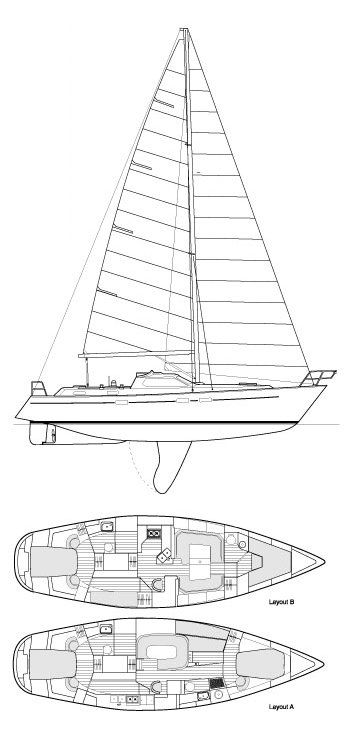The Southerly 135 Mk 2 stands as a testament to versatile cruising, expertly blending offshore capability with the unique advantage of shallow-water access. Designed by the renowned Rob Humphreys, and built by Northshore Yachts, this masthead sloop embodies a design philosophy centered on offering sailors the "best of two distinct cruising worlds". Known for its robust construction and the signature Southerly swing keel, the 135 Mk 2 is a highly capable long-distance cruiser that appeals to those seeking to explore both deep oceans and secluded, shallow anchorages.
Southerly 135 Mk 2 Information, Review, Specs

- Make
- Southerly
- Model
- 135 Mk 2
- Number Built
- 8
- Production Year(s)
- 1988 - ??
History and Design
The Southerly 135 Mk 2 began its production in 1988, building upon the innovative legacy of Northshore Yachts, a builder synonymous with shallow-draft sailing since its origins as Fairways Marine in the early 1970s. Northshore established a formidable reputation for producing yachts with exceptional sailing performance and unparalleled versatility, primarily through its pioneering lifting, or "swing," keel technology. The 135 was designed by Rob Humphreys, who was brought in by Northshore to refine previous models, and for many years, the Southerly 135 served as the flagship of the Southerly range.
Originating from England, where extreme tidal ranges are common, the design of the Southerly 135 Mk 2 emphasizes a heavy, well-engineered swing keel that allows for a dramatic change in draft—from a minimum of 2 feet 9 inches (0.84m) with the keel raised to a substantial 9 feet 8 inches (2.96m) when fully deployed. This variable draft capability enables owners to navigate shallow waters, explore otherwise inaccessible anchorages, and even beach the yacht upright. While there was an earlier Mk 1 version, the Mk 2 (and subsequent RS versions) represent refinements in this robust design, ensuring a sturdy offshore boat with inherent stability.
Sailing Performance and Handling
The Southerly 135 Mk 2, with its masthead sloop rigging, is characterized by its balanced and stable sailing performance, a hallmark of Rob Humphreys' designs. Interpreting its key performance ratios, the yacht exhibits a Ballast to Displacement ratio of approximately 42.3%, indicating a stiff and stable vessel capable of standing up well to a considerable amount of wind. This high ballast ratio contributes significantly to its reputation as a sturdy offshore boat.
Its Displacement to Length ratio, calculated at around 264.49, categorizes the Southerly 135 Mk 2 as a moderately heavy cruiser. This suggests a comfortable motion in a seaway, prioritizing stability and load-carrying capacity over extreme light-air speed, aligning with descriptions that it is "not a speed demon". The Sail Area to Displacement ratio, approximately 15.62, indicates reasonable performance, though some might find "more sail power will be useful anywhere the wind is apt to be light". Owners generally find that an experienced cruising couple can manage this vessel without problems, highlighting its ease of handling despite its size. The efficient deck layout further supports this, being well-suited for a vessel intended for serious cruising.
Accommodations and Layout
The interior of the Southerly 135 Mk 2 is designed for comfortable extended cruising, offering generous living spaces below deck. Northshore Yachts built the 135 with at least two distinct interior layouts, both retaining fore and aft cabins. A common configuration includes two double cabins and two showers/heads, providing privacy and convenience for multiple occupants or long-term living. One popular layout features a U-shaped galley within the saloon, while others may opt for a linear galley.
The saloon is typically built around the swing keel trunk, cleverly integrated into the design. Berthing options often allow for a total of eight berths, with two in the forecabin, two midships, and two in the aft cabin. The galley commonly features twin stainless steel sinks, with laminated surfaces, reflecting a practical approach to onboard living. Ventilation and light are provided by multiple opening deck hatches, including two large ones over the fore and aft cabins. These details point to an interior that, while focused on practicality for cruising, also provides ample comfort and functionality.
Measurements
Construction & Hull
- Construction Material
- Fiberglass (Solid)
- Hull Type
- Monohull Sailboat
- Keel Type
- Wing
- Rudder
- 1x —
- Ballast
- 9770 lbs (Iron)
- Displacement
- 23100 lbs
- Water Capacity
- -
- Fuel Capacity
- -
Engine
- Engine Make
- Yanmar
- Engine Model
- —
- Engine Type
- —
- Engine HP
- 56
- Engine Count
- 1
- Drive Type
- —
- Fuel Type
- Diesel
Rig & Sails
- Rig Type
- Masthead Sloop
- P (Main Luff)
- -
- E (Main Foot)
- -
- I (Foretriangle Height)
- -
- J (Foretriangle Base)
- -
- Forestay Length (est)
- -
- Main Sail Area
- -
- Foretriangle Sail Area
- -
- Total Sail Area (Reported)
- -
- Total Sail Area (Calc)
- -
Dimensions
- LOA
- 44 ft
- LWL
- 33.92 ft
- Beam
- 13.25 ft
- Draft
- 9.5 ft
- Max Headroom
- -
- Air Draft
- -
Calculations
- Hull Speed
- 7.8 kn
- Pounds per Inch Immersion
- 1